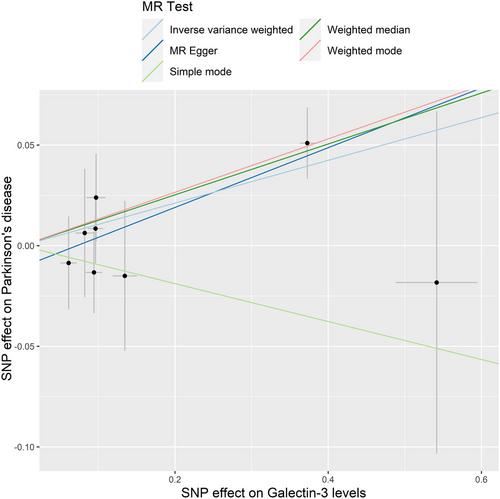Parkinson's disease (PD) is a prevalent neurodegenerative disorder with poor prognosis. Observational studies have demonstrated a significant correlation between serum galectin-3 and PD, suggesting a potential role of galectin-3 as a biomarker for PD. However, it is still unclear whether galectin-3 contributes to the risk of the disease.
A two-sample Mendelian randomization (MR) approach was used in this study. Genetic instruments for serum galectin-3 level were selected from a genome-wide association study (GWAS), including 30,931 European individuals. Summary-level statistics for PD were derived from another published GWAS, including 33,674 cases and 449,056 controls. Primary analysis was conducted using the inverse-variance weighting (IVW) method. Weighted median, MR-Egger, simple mode, weighted mode, and MR-pleiotropy residual sum and outlier (MR-PRESSO) methods were used as complementary analyses. To detect heterogeneity, Cochran's Q statistic and leave-one-out analysis were used. For testing potential horizontal pleiotropy, the MR-Egger intercept test and MR-PRESSO global test were conducted.
MR analysis using IVW model (OR 1.112, 95% CI 1.025–1.206, p = 0.010), weighted median (OR 1.135, 95% CI 1.037–1.242, p = 0.006), weighted mode (OR 1.142, 95% CI 1.038–1.257, p = 0.030), and MR-PRESSO (OR 1.112, 95% CI 1.046–1.182, p = 0.012) presented a consistent result, indicating that increased serum galectin-3 was associated with a higher risk of PD. No heterogeneity or horizontal pleiotropy was detected in the analyses.
The study shows a suggestive association between galectin-3 and PD. Increasing serum galectin-3 was associated with an increase in PD risk. Galectin-3 may play an important role in the causal pathway to PD.



